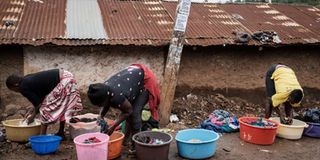Lack of gender data hurting women

What you need to know:
- Although gender disaggregated data illuminates gender inequalities, governments are yet to invest much towards collating information on the most vulnerable.
- Because of lack of data, global approaches do not take into consideration the real needs of women and children.
- Data influences development of innovations like cash transfers programs, early warning systems and focus based financing.
- Governments should invest in data systems as it is the only way to change the lives of the 42-66 million people pushed into extreme poverty, with women, children and adolescents being disproportionately affected.
Women, children and adolescents would be left far behind even as the world progresses towards sustainable development if governments continue to fail to invest in gender disaggregated data.
Global development leaders argue that although gender disaggregated data illuminates gender inequalities, governments across the world are yet to invest much towards collating information on the most vulnerable.
“We hear slogans ‘let’s walk the last mile’, ‘let’s make sure that nobody is left behind’ but it won’t happen without good data,” said Chair of the Board, Kofi Annan Foundation, Elhadj As Sy during virtual launch of a report by UN Secretary-General’s Independent Accountability Panel for Every Woman Every Child(EWEC) on Monday.
“The best use of data has shown us that people with disability are left behind or totally excluded,” he noted during the unveiling of the report “Caught in the COVID-19 storm: progress and accountability for women’s, children’s and adolescents’ health in the context of UHC and SDGs”.
VULNERABILITIES
He added that: “Because of lack of data we have global approaches that do not take into consideration the real needs of women and children.”
He said good data entails information on gender, age and variance of vulnerabilities.
Mr Sy noted that good data influences development of innovations like cash transfers programs, early warning systems and focus based financing, solving the real needs of the most vulnerable.
Co-Chair, Independent Accountability Panel for EWECJoy Phumaphi said with data, citizens can hold governments and leaders accountable to their commitments.
“Accountability is a must have, not a nice to have,” she said.
“When commitments are translated into progress and rights only then will we live up to our promise to the world’s women, children and adolescents; it is to them that we are all ultimately accountable.”
She urged governments to invest in data systems as that is the only way they can change the lives of the 42-66 million people who have been pushed into extreme poverty, with women, children and adolescents being disproportionately affected.
UNIVERSAL HEALTH
“We must uncover the means to protect women and girls not just during this pandemic, but up to 2030 and beyond,” she said.
She said 20-40 per cent of global health expenditures are being wasted due to inefficiencies and corruption. This, she said is an obstacle to achieving universal health coverage(UHC) whose provision bolsters delivery of maternal and child healthcare services.
Director-General for World Health OrganisationDr Tedros Adhanom Ghebreyesus affirmed that with accountability, global commitments made on UHC and primary healthcare would be achieved leading to “real benefits.”
“We must listen to the people we serve and to whom we are accountable,” he said
He said: “By working in solidarity, we can deploy accountability in health to transform commitments into progress and make real difference to the most vulnerable and marginalised in our world.”
Inter-Parliamentary Union president Gabriela Cuevas Barron said Parliaments must be committed to playing their oversight role effectively as they are accountable to the people they represent.
She argued that Parliaments would be more responsive if gender parity in representation is achieved.
“Only 24.5 per cent of the total world parliamentarians are women, that is not representative, that is not inclusive,” she said.





